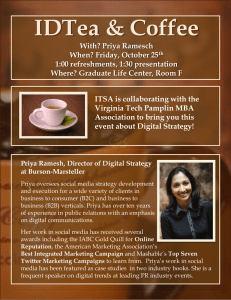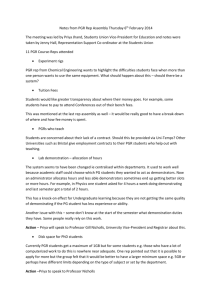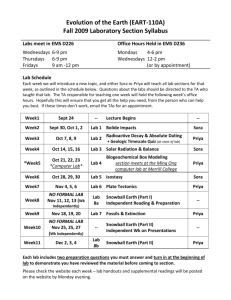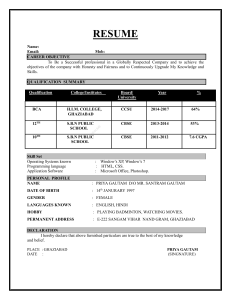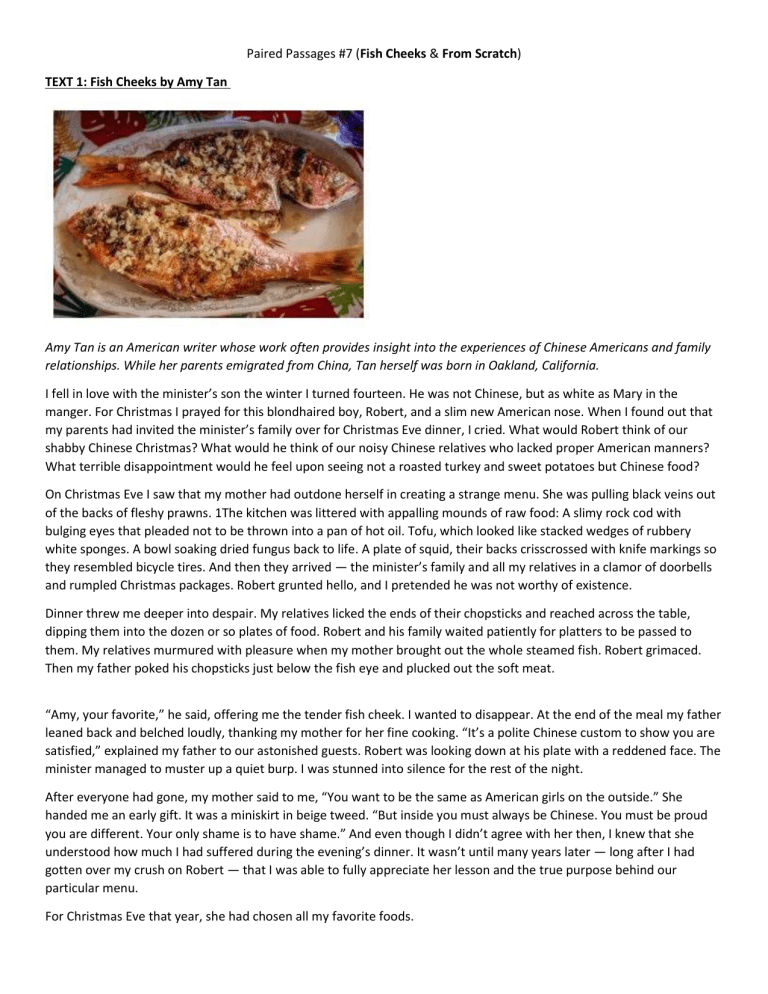
Paired Passages #7 (Fish Cheeks & From Scratch) TEXT 1: Fish Cheeks by Amy Tan Amy Tan is an American writer whose work often provides insight into the experiences of Chinese Americans and family relationships. While her parents emigrated from China, Tan herself was born in Oakland, California. I fell in love with the minister’s son the winter I turned fourteen. He was not Chinese, but as white as Mary in the manger. For Christmas I prayed for this blondhaired boy, Robert, and a slim new American nose. When I found out that my parents had invited the minister’s family over for Christmas Eve dinner, I cried. What would Robert think of our shabby Chinese Christmas? What would he think of our noisy Chinese relatives who lacked proper American manners? What terrible disappointment would he feel upon seeing not a roasted turkey and sweet potatoes but Chinese food? On Christmas Eve I saw that my mother had outdone herself in creating a strange menu. She was pulling black veins out of the backs of fleshy prawns. 1The kitchen was littered with appalling mounds of raw food: A slimy rock cod with bulging eyes that pleaded not to be thrown into a pan of hot oil. Tofu, which looked like stacked wedges of rubbery white sponges. A bowl soaking dried fungus back to life. A plate of squid, their backs crisscrossed with knife markings so they resembled bicycle tires. And then they arrived — the minister’s family and all my relatives in a clamor of doorbells and rumpled Christmas packages. Robert grunted hello, and I pretended he was not worthy of existence. Dinner threw me deeper into despair. My relatives licked the ends of their chopsticks and reached across the table, dipping them into the dozen or so plates of food. Robert and his family waited patiently for platters to be passed to them. My relatives murmured with pleasure when my mother brought out the whole steamed fish. Robert grimaced. Then my father poked his chopsticks just below the fish eye and plucked out the soft meat. “Amy, your favorite,” he said, offering me the tender fish cheek. I wanted to disappear. At the end of the meal my father leaned back and belched loudly, thanking my mother for her fine cooking. “It’s a polite Chinese custom to show you are satisfied,” explained my father to our astonished guests. Robert was looking down at his plate with a reddened face. The minister managed to muster up a quiet burp. I was stunned into silence for the rest of the night. After everyone had gone, my mother said to me, “You want to be the same as American girls on the outside.” She handed me an early gift. It was a miniskirt in beige tweed. “But inside you must always be Chinese. You must be proud you are different. Your only shame is to have shame.” And even though I didn’t agree with her then, I knew that she understood how much I had suffered during the evening’s dinner. It wasn’t until many years later — long after I had gotten over my crush on Robert — that I was able to fully appreciate her lesson and the true purpose behind our particular menu. For Christmas Eve that year, she had chosen all my favorite foods. 1. Prawn is a common name for shrimp, used particularly in the United Kingdom and Ireland. 2. Appalling (adjective) causing shock, disgust, or alarm 3. Clamor(noun) loud and confusing noise TEXT 2: From Scratch by Susie Castellano [1] Priya’s mother placed the pot of water on the stove, and Priya poured in the sugar. One, two, three, four cups of the sugary crystals glinted under the stove light. Priya peered into the pot as she stirred the sugar water. Soon it would be thick and syrupy. “Mummy, what time is it back home...” Priya stopped and corrected herself. “I mean... in India?” Her mother rattled around in the cabinet for another small pot. “Here it is seven at night, so in India it is sixthirty in the morning.” "Untitled" by ikon is licensed under CC0. Time for chai,1 Priya thought. She pictured Ama squatting in their little kitchen, her orange-and-yellow sari draped around her shoulders and over her head in the traditional way. She’d sing a silly song in Hindi about the weather as she fixed the morning tea on the little electric stove: “Dum dum diga diga, mosum big biga...” Priya felt a sharp pang in her chest as her grandmother’s voice flooded her mind. She didn’t want her mother to see her tears, so she stared into the pot, stirring absently. Mummy placed a stick of butter in the second pot and adjusted the heat. Priya watched the waxy butter slowly turn to foamy liquid. “Will you get out the dry milk and the baking mix?” her mother asked. Priya opened the cupboard and stared at the prepackaged baking mix her mother had bought at the big indoor supermarket. Already her mother was adjusting to their new life, buying quick American ingredients to replace the traditional ones that were now hard to find. In India, everything was made from scratch. Reluctantly, Priya opened the baking mix and poured it into a bowl with the dry milk. Priya hated the American supermarket. It felt cold and unfriendly, and the fluorescent ceiling lights hurt her eyes. Priya thought about the bazaar, the outdoor marketplace near Delhi. There were vegetable stands and crowds of chattering people, kiosks with colorful bindis, and the warm smell of spices from the dhaba.2 There 1. tea 1were shops with rainbows of blankets, silver and gold jewelry glittering in the sun, and fabric shops where her mother bought material for her clothes. Best of all, there was the little bracelet stand, where shiny bangles painted walls with splashes of red, purples, orange, and green. Every autumn, just before the Diwali holiday festival, her father would give her ten rupees to buy new bracelets. Priya hadn’t worn her sparkling bangles since they’d stepped off the plane in Dallas, Texas, five weeks ago. They remained hidden in her drawer, in the little velvet pouch Ama had sewn for her. Priya thought about her mother browsing the long supermarket aisles with a clangy metal shopping cart, her dupatta 3swinging behind her in a wave of color. Suddenly her throat felt tight again. Mummy wanted so much for her to be happy here. “Do you want this for your lunch or this?” she would ask, offering Priya packaged snacks in colorful, cartoon boxes with big letters that shouted “New!” “Great Taste!” and “Quick and Easy!” In India, Priya might have traded all the bangles in the world for a box of the sweet, brightly colored treats. Now they just reminded her of the kids at school, the ones who stared as she unpacked channa dal and chapatis4 from her lunch bag in the cafeteria. For days she sat alone in the lunchroom, hiding her food behind her paper sack so no one would see that she didn’t have jelly and peanut butter or cartoon-shaped fruit snacks. Finally she had selected a jar of peanut butter at the supermarket and described the sandwich for Mummy to make. It tasted sugary-sweet and made her mouth feel stuck shut. But she ate it anyway, grateful that at least no one stared or whispered. Priya looked at her mother, who was busy grinding the beady black cardamom seeds to powder in a marble bowl. Her long, ebony hair was pulled into a braid, but as she worked at crushing the seeds, wisps of hair blew forward and back around her face, like a curtain near an open window. She was not like the other mothers, the American mothers with their short hair dyed and cut like movie stars and their wide, painted smiles. She loved her mother’s soft, golden face and her thoughtful silence. She didn’t want her mother to change; in fact, she much preferred Mummy’s quiet reserve to the loud way some had of talking just to chase out the quiet. But Priya had seen how the other children stared at her mother when she came to school after the first day. Mummy had worn her beautiful green salwar kurta,5 more casual than a sari but still elegant and flowing. She had also worn a decorative bindi6 on her forehead, silver ankle bracelets that jingled when she walked, and matching toe rings. Everyone stared, and Priya’s face grew hot. She felt embarrassed, and guilty for feeling embarrassed. She forced a smile and kissed her mother on the cheek, then choked back tears the whole way home. Priya’s mother swept the cardamom powder into the baking mix, and Priya drizzled in the melted butter. As Priya stirred the mixture, her mother’s eyes caught hers. They both smiled, and Mummy asked, “Did you make any new friends today?” Priya stared into the bowl. “I met a girl from France,” she said. Actually, the teacher had paired them together 2. a small eatery where food is prepared and sold 3. a long sash that goes with the salwar kurta outfit 4. Channa dal is a stew made with lentils. Chapati is a round, flat bread eaten with most meals in India. 5. a less formal women's outfit: a knee-length blouse and loose-fitting, lightweight pants 6. colorful, decorative adhesive worn on a woman's forehead, between the eyebrows 2because they were the only ones left after everyone had chosen science partners. [15] [20] [25] “Ah,” Mummy said, crumbling the dough with her fingers. “And what did you have for lunch?” Priya thought about what to tell her mother. After the peanut butter sandwiches had grown tiresome, she had begun buying lunch at the cafeteria. But that, too, drew attention because she could only eat the vegetarian items, no meat or fish. Children watched as she passed over the hamburger patties and chicken nuggets, choosing only watery green beans and lumpy blobs of mashed potatoes. Lindsay, a blond girl in her class, had asked, “Why don’t you eat meat?” P riya had thought about telling her the story Ama had told a hundred times, about how the gods came to Earth in different forms, and how Brahma had once come to live amongst the people as a cow. Because of that, Hindus do not eat beef, fearing they might harm a god in disguise. She smiled as she remembered waiting in dusty traffic jams in Delhi, all because a cow had decided to nap in the road, and no one would disturb it. But when Priya had looked at the girl’s big, blue, wondering eyes in the cafeteria, she decided Lindsay wouldn’t understand the story about Brahma and the cow. So she had mumbled an excuse and hurried away from the food line. She couldn’t be Indian anymore and she didn’t know how to be American. She didn’t fit anywhere. “I had some green beans and salad,” she said, looking down. Her mother studied her closely, then glanced at the stove. “Time to test the syrup, chicaree.” Leaving the crumbly dough to her mother, Priya dribbled a tiny drop of syrup from the pot onto her finger, then pressed her finger and thumb together and slowly pulled them apart. “It’s ready, Mummy,” she said, seeing the syrup form a threadlike string between her fingers. Her mother nodded and was quiet. Priya peeked at her mother, who was mixing the milk and rose water into the dough. She wore a pair of American blue jeans that she had bought at the mall, but over the jeans she had slipped her long yellow salwar kurta blouse. It reminded Priya of a snake that had shed only half its skin and was waiting for the rest to slip off. As much as she had wished her mother looked more American that day at school, she felt a glimmer of fear to see it coming true. She imagined all her mother’s beautiful saris and salwar suits buried in the back of the closet, replaced by blue jeans, sundresses, and crisp American slacks. What would come next — her mother frying meat patties on the stove each night? Priya and Mummy began rolling the gulab jamun7 dough into balls. “About as wide as two fingers,” Mummy always said. 7. round, sweet dessert balls made from flour, cardamom, and rose water and soaked in syrup 3As they worked in silence, Priya’s mother glanced at her. “Maybe your class would like to try Indian food sometime?” Priya swallowed thickly. “Maybe,” she said. She tried to picture blue-eyed Lindsay biting into a golden, sticky gulab jamun. What if she spit it out? What if everyone laughed? The thought made Priya sick to her stomach. Priya’s mother melted shortening in a large frying pan, and one by one, Priya began dropping the little dough balls in. “I spoke with your teacher today,” Mummy said, wiping the counter with quick, practiced motions. Priya silently nudged the little white balls with a spoon, turning them so they would brown evenly on all sides. “She mentioned that there is a Muslim girl in your class...?” Priya flashed her mother a quick look. “Muslim?” The faces of the people at school flickered through her mind one by one. She didn’t remember seeing any dark-haired Muslim girl. Priya’s mother began scooping the golden balls out of the oil. “Her name is Lindsay. Mrs. Swanson said she moved here from Iran last year. Apparently she had a hard time adjusting and has been very lonely.” Priya’s head spun with confusion. Blond-haired, blue-eyed Lindsay? She seemed to fit in perfectly with the other kids. Priya shook her head. “The Lindsay in my class... is light skinned. She’s American. She speaks English perfectly.” “Mrs. Swanson said her father is Iranian and her mother is American. They moved to Iran when she was very young, and she grew up there.” Priya’s mother eyed her pointedly. “She was raised bilingual, like you. She speaks Persian and English.” Priya thought back to the day in the cafeteria when Lindsay had asked why she didn’t eat meat. She knew Muslims didn’t eat pork, so could it be that Lindsay was trying to find something in common with someone? To connect with a culture that seemed similar to her own? Priya remembered how she had mumbled rudely and walked away. Suddenly, she felt ashamed. She had never given Lindsay a chance. Maybe Lindsay even thought she was unfriendly. Priya helped her mother scoop the rest of the gulab jamun out of the pan. They worked quietly and easily, dabbing the extra oil from the golden balls before dropping them gently into the syrup. When they were done, Priya admired the rich, glowing batch of sweets they had made. She thought how much Ama would have liked them. Then she took a deep breath. “Maybe I could take these to school tomorrow, to share with my class,” she said at last. Priya’s mother cocked her head lightly from side to side, the Indian way of saying O.K. It was a casual gesture, but Priya saw her mother smiling behind her dark curtain of hair. They never needed many words, Mummy and she. As she stretched a thin sheet of plastic wrap over the bowl of gulab jamun, Priya wondered if Lindsay had beautiful things from her country hidden in a velvet pouch in her drawer. Maybe tomorrow she would ask.
